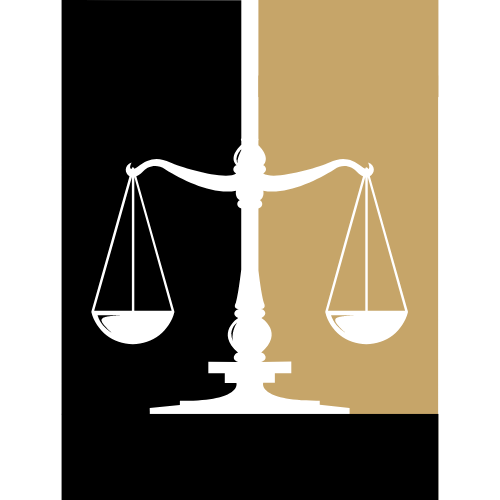In the United States, over 2.3 million people are in jail, making our country the biggest jailer in the world. If you or someone you love is facing criminal charges, understanding criminal defense strategies is key. This guide will show you effective ways to protect your rights and achieve the best result in your case.
Our skilled criminal defense lawyers will help you understand the complex justice system. They will give you the tools to deal with legal procedures and ensure your rights are respected. No matter the charge, the strategies in this article can greatly impact your case’s outcome.
Key Takeaways
- Understand your rights and the inner workings of the criminal justice system
- Develop a comprehensive defense strategy to protect your interests
- Analyze evidence and uncover weaknesses in the prosecution’s case
- Assert your constitutional rights, including against unlawful searches and seizures
- Effectively negotiate plea bargains and prepare for trial
Understanding the Criminal Justice System
Getting through the criminal justice system can feel overwhelming. Yet, it’s key to grasp its details to craft a strong defense. This system includes many legal steps, from arrest to sentencing. Each step must follow the rules of due process and equal protection.
Navigating Complex Legal Procedures
The criminal justice system has many legal steps, each with its own rules. These steps include arraignment, preliminary hearings, and plea bargaining. Knowing these steps and their timelines is vital for a solid defense plan.
Ensuring Due Process and Equal Protection
The U.S. Constitution ensures everyone in the justice system gets due process and equal protection. This means the government must follow the law and treat everyone fairly. Protecting these rights is crucial in defending against criminal charges.
| Key Principles | Explanation |
|---|---|
| Due Process | The requirement that the government must follow established legal procedures when depriving a person of life, liberty, or property. |
| Equal Protection | The guarantee that the government will treat all individuals in the criminal justice system fairly and without discrimination. |
“The criminal justice system is a complex and often intimidating landscape, but with the right guidance and understanding, you can navigate it and protect your rights.”
Building a Solid Defense Strategy
Creating a strong criminal defense strategy is key to winning a case. Our team of experienced lawyers works closely with each client. They carefully look at the case details, find weak spots in the prosecution’s argument, and build a defense that fits the client’s needs.
Dealing with criminal charges can be overwhelming. That’s why we take a detailed approach to building a solid defense. We focus on several important areas:
- Thorough Case Analysis: We go through all the evidence, documents, and witness statements. This helps us understand the case fully and find any mistakes in the prosecution’s argument.
- Identification of Legal Defenses: Our legal team looks for legal defenses that might apply, like self-defense or lack of intent. We then plan how to present these defenses well.
- Negotiation and Plea Bargaining: Sometimes, we can work with the prosecution to get a better deal. This could mean less severe charges or a lighter sentence.
- Preparation for Trial: If the case goes to trial, we prepare everything carefully. We create a strong story, make a compelling opening statement, and get ready to question witnesses.
By working closely with our clients and using our criminal defense strategy and legal tactics, we aim to give the best defense. We want to protect your rights and get the best outcome for you.
| Key Elements of a Solid Criminal Defense Strategy | Description |
|---|---|
| Thorough Case Analysis | Meticulously reviewing all evidence, documents, and witness statements to gain a comprehensive understanding of the case and identify potential weaknesses in the prosecution’s argument. |
| Identification of Legal Defenses | Exploring various legal defenses that may be applicable to the case, such as self-defense, alibi, or lack of criminal intent, and developing a strategy to effectively present these defenses. |
| Negotiation and Plea Bargaining | Engaging in negotiations with the prosecution to potentially reach a favorable plea bargain, reducing the charges or the severity of the sentence. |
| Preparation for Trial | Meticulously preparing the case, crafting a compelling narrative, developing a strong opening statement, and preparing for cross-examination of witnesses. |
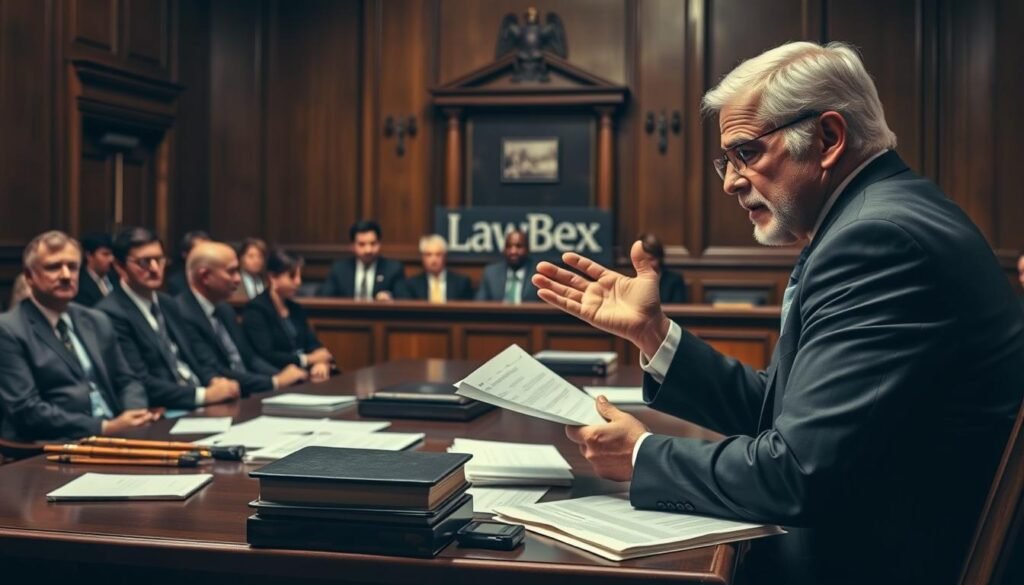
“The key to a successful criminal defense is a comprehensive strategy that addresses every aspect of the case, from the initial investigation to the final disposition.”
Analyzing Evidence and Uncovering Weaknesses
We dive deep into the evidence the prosecution has. Our team checks witness statements for any mistakes or biases. We also look closely at scientific and forensic evidence for any errors or flaws.
Scrutinizing Witness Testimonies
Witness statements are key for the prosecution. But, they can be wrong. We check if witnesses are telling the truth and if they might have reasons to lie.
We look for any mistakes in what they say. Our goal is to find and use these weaknesses to help your defense.
Challenging Scientific and Forensic Evidence
Today, science and forensic evidence are big parts of cases. But, even the latest tech can go wrong. We review this evidence carefully.
We work with experts to make sure it’s right. If we find mistakes, we use them to help your case.
| Evidence Analysis | Witness Testimony | Forensic Evidence |
|---|---|---|
| Thorough examination of all evidence presented by the prosecution | Careful scrutiny of witness credibility and reliability | Rigorous challenge of scientific and forensic findings |
| Identification of potential weaknesses or inconsistencies | Exposure of discrepancies in witness statements | Consultation with expert witnesses to ensure accurate interpretation |
| Leveraging identified weaknesses to strengthen the defense | Undermining the prosecution’s case by questioning witness credibility | Highlighting flaws or errors in forensic analysis |
We aim to find and use any weaknesses in the evidence. This helps build a strong defense for you.
Asserting Constitutional Rights
At the heart of a strong defense is protecting your constitutional rights. We, as your lawyers, will make sure these rights are respected in court.
Protecting Against Unlawful Searches and Seizures
The Fourth Amendment is key in the justice system. It protects against unreasonable searches and seizures. We’ll look closely at any police actions, fighting any unlawful search and seizure.
By defending your constitutional rights, we can keep out bad evidence. This keeps the legal process fair and strengthens your defense.
| Constitutional Right | Significance in Criminal Defense |
|---|---|
| Fourth Amendment | Protects against unreasonable searches and seizures, ensuring that evidence obtained through improper means is not admissible in court. |
| Fifth Amendment | Safeguards the right against self-incrimination, allowing individuals to remain silent and not provide any statements that could be used against them. |
| Sixth Amendment | Guarantees the right to a speedy and public trial, as well as the right to an impartial jury and the assistance of legal counsel. |
We’ll carefully check if these constitutional rights were followed. This helps us challenge any wrongs and build a strong defense. It ensures a fair trial for you.

“The Constitution is not a mere lawyers’ document; it is a vehicle of life, and its spirit is always the spirit of the age.” – Justice Hugo Black
Negotiating Plea Bargains
Dealing with criminal charges can be tough. Our skilled lawyers know that sometimes, the best choice is to negotiate a plea bargain. We work hard with the prosecution to find solutions that help you and reduce penalties.
Plea bargaining can be smart in some cases. It lets us look for better options than a full trial. We carefully review your case, think about the trial outcomes, and then negotiate with the prosecution. Our goal is to get you the best plea deal.
We know how complex plea bargaining can be. It’s crucial to make sure any deal protects your rights and is in your best interest. Using our deep understanding of the law, we aim to get a plea bargain that lessens the criminal charges impact on you.
“Plea bargaining can be a valuable tool in the right circumstances, but it requires a delicate balance of negotiation skills and a deep understanding of the law. Our team is committed to exploring every avenue to achieve the best possible outcome for our clients.”
Every case is different, and choosing to plea bargain is a big decision. Our lawyers will guide you, making sure you know your options and what might happen. We’ll work together to find the best way to protect your rights and future.
Criminal Defense Strategies: Crafting a Compelling Narrative
We focus on creating a strong narrative for our clients. This story must connect with the judge and jury. We aim to show the unique circumstances and factors that led to the situation, appealing to their empathy.
Humanizing the Client’s Story
Our defense strategy goes beyond just presenting facts. We paint a detailed picture of our client’s life and the events leading up to the legal issue. This approach helps the judge and jury see our client as a whole person, not just a defendant.
Appealing to the Jury’s Empathy
The success of our defense often depends on connecting with the jury. We work hard to create a story that touches their hearts. By sharing our client’s personal struggles and family obligations, we aim to build an emotional bond with the jury.
| Key Strategies | Description |
|---|---|
| Humanizing the Client | Highlighting the client’s unique circumstances, experiences, and personal struggles to create a more relatable and sympathetic portrayal. |
| Appealing to Empathy | Crafting a narrative that elicits the jury’s compassion and understanding, fostering a more favorable disposition towards the client. |
| Emphasizing Mitigating Factors | Identifying and presenting mitigating factors, such as mental health issues, difficult upbringing, or extenuating circumstances, to provide context and potentially influence sentencing. |
Through these criminal defense strategies, we aim to create a narrative that not only presents the case facts but also humanizes our client. This approach is key to achieving the best outcome for our clients.
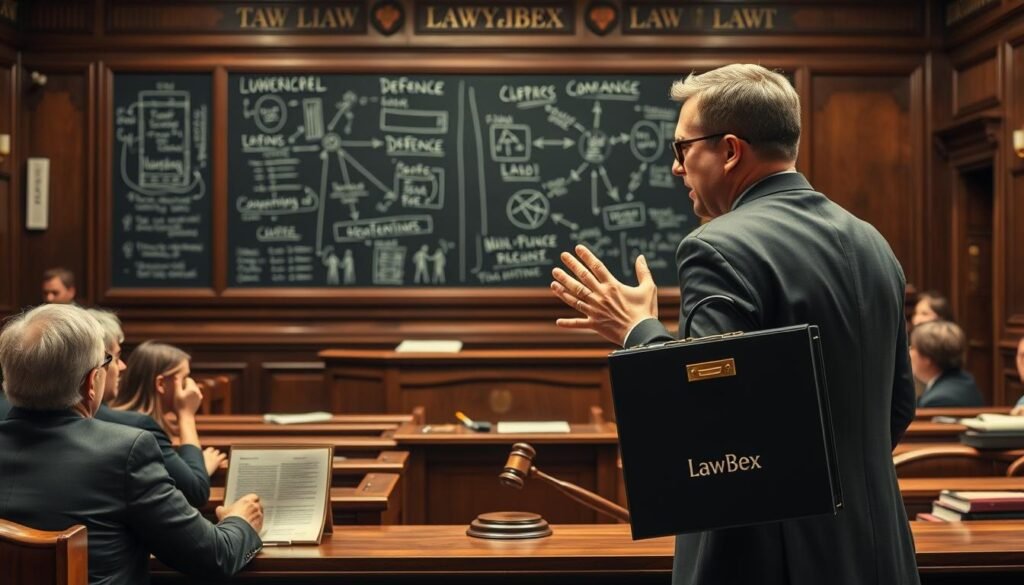
Preparing for Trial
As your case moves to trial, our team will prepare every detail. A key part of this is crafting a strong opening statement. This sets the tone, outlines your defense, and aims for a successful result.
Mastering the Art of the Opening Statement
The opening statement is your first chance to impress the jury. We aim to create a compelling story that grabs their attention. Our goal is to present a clear, strong case that sticks with the jurors.
To do this, we focus on several important steps:
- We craft a narrative that tells your story and shows the prosecution’s case weaknesses.
- We identify key facts and evidence that support your defense and include them in the opening statement.
- We anticipate the prosecution’s arguments and address them early, weakening their case.
- We deliver the opening statement confidently, clearly, and with conviction, engaging the jury.
By carefully preparing the opening statement, we build a strong foundation for the trial. This increases your chances of a positive outcome.
“The opening statement is your opportunity to tell the jury your side of the story. It’s your chance to set the tone and lay the groundwork for your defense.”
Cross-Examination Techniques
As skilled criminal defense attorneys, we know how important cross-examination is. It helps us challenge the prosecution’s witnesses and find any flaws in their stories. By doing this, we can create doubt and help your defense.
Exposing Inconsistencies and Biases
We use special techniques to check the witness’s words for any mistakes or biases. We ask tough questions and listen closely to their answers. Then, we use more questions to find any witness credibility problems.
We also look into the witness’s possible biases and what might drive their story. By showing these biases, we can weaken their testimony. This helps your defense a lot.
| Cross-Examination Techniques | Objectives |
|---|---|
| Identifying Contradictions | Expose inconsistencies in witness testimony |
| Probing for Biases | Uncover potential biases or agendas that may influence the witness’s credibility |
| Establishing Timeline Discrepancies | Highlight gaps or inaccuracies in the witness’s recollection of events |
| Utilizing Leading Questions | Guide the witness to provide responses that undermine their previous statements |
With these techniques, we aim to challenge the prosecution’s witnesses. We want to make their stories seem less believable. This way, we can build a strong defense for you.
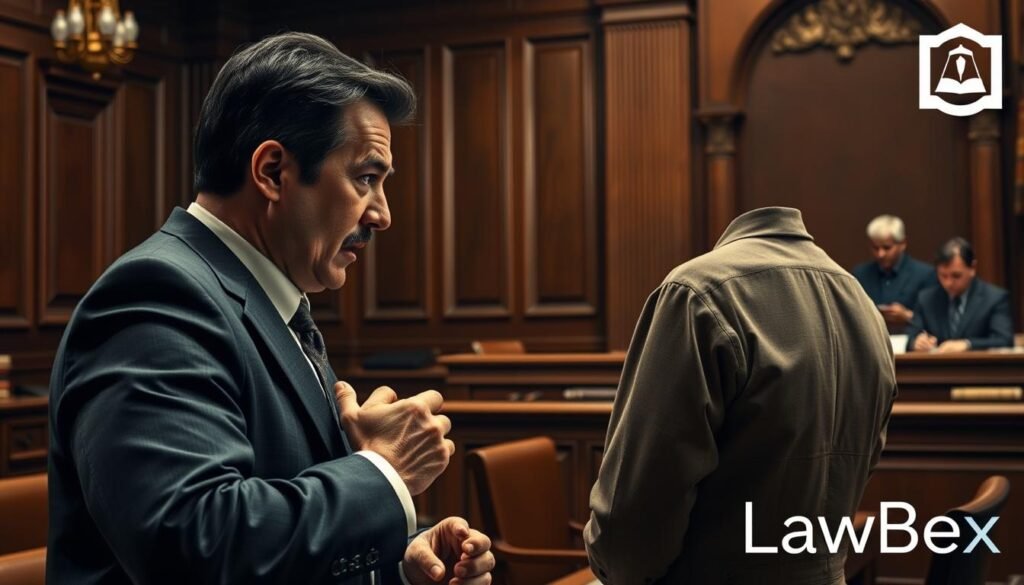
“Effective cross-examination is not about winning every battle; it’s about winning the war. By carefully exposing weaknesses and inconsistencies, we can undermine the prosecution’s case and advocate for your rights.”
Sentencing Advocacy
When you’re convicted, our main goal is to help with sentencing. We aim to make strong arguments to the court. We focus on any factors that could lessen your punishment and help you move on.
Uncovering Mitigating Factors
Our skilled defense lawyers will dig deep into your case. They look for any factors that could change the court’s mind. These might include:
- Evidence of childhood trauma or tough life circumstances
- Proof of your efforts to change and grow
- Strong ties to your community and support system
- A lack of serious crimes in your past
Exploring Alternative Sentencing Options
We also look for different ways to punish you that might be better. These could be:
- Community service programs
- Probation or supervised release
- Residential treatment facilities
- House arrest or electronic monitoring
We want to show the court that alternative sentencing is a good choice. It addresses the real issues and lets you move forward positively.
“The goal of sentencing advocacy is to ensure that the punishment fits the crime and the individual, not just the offense.”
We are fully committed to sentencing advocacy. We believe in using mitigating factors and alternative sentencing to protect your rights. We will fight hard to get the best outcome for you.
Appealing Convictions
If you’re convicted, we’re here to explore all appeal options. Our team carefully reviews the trial and legal decisions. We look for errors or violations of your constitutional rights to appeal and possibly overturn the conviction.
We know how serious a criminal conviction is. It can greatly affect your life. That’s why we fight hard for your rights and justice in appeals. Our skilled attorneys will check every detail to get a good outcome.
- Thorough Review of Trial Proceedings: We’ll deeply analyze the trial record, looking at every detail for appeal grounds.
- Identification of Legal Errors: Our team will find any errors in legal rulings, evidentiary decisions, or jury instructions that might have unfairly affected your case.
- Challenging Constitutional Violations: If your constitutional rights were violated during the trial, we’ll build a strong appeal case to overturn the conviction.
- Appellate Brief Preparation: Our attorneys will write a strong appellate brief. It will present a clear and convincing argument to the higher court, explaining why the conviction should be reversed.
- Oral Arguments: If needed, we’ll make oral arguments before the appellate court. We’ll strongly advocate for your case and answer any questions the judges might have.
The appeal process is a key part of the criminal justice system. We’re committed to protecting your rights. With our legal knowledge and dedication, we’ll work hard to get a positive outcome and overturn your conviction.
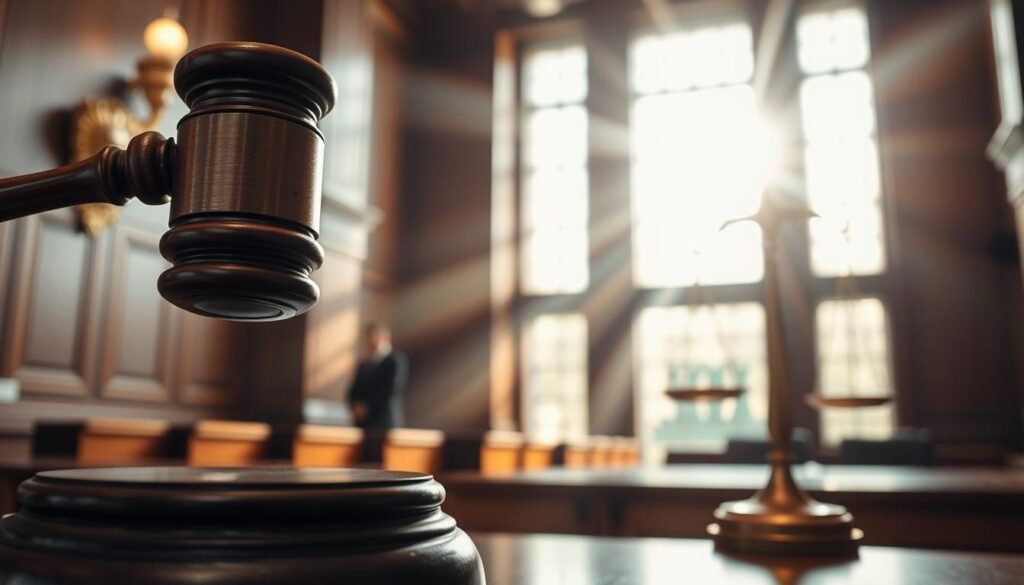
“We will never stop fighting for our clients, even in the face of a conviction. The appellate process is our chance to correct wrongs and ensure justice is served.”
Ethical Considerations for Defense Attorneys
As your defense attorneys, we follow a strict code of ethics. This code ensures we act with integrity and keep your secrets safe. We always put your interests first, following the key principles of our profession.
Keeping ethics in mind is crucial for defense attorneys to protect the justice system’s fairness. Our job is to fight for you with all our might. We make sure your rights are respected and the law is followed in court.
- Keeping your secrets safe is a big part of our job. We promise not to share your information without your okay.
- We do a deep dive into every piece of evidence. This is true whether it helps or hurts your case.
- It’s important for us to know the latest in law and best practices. This helps us defend you the best way possible.
- We make sure we don’t have any conflicts of interest. This way, we can represent you without any other loyalties getting in the way.
By sticking to these ethics, we can protect your rights. And we make sure you get the fair defense you deserve.
“Ethical conduct is the bedrock of effective criminal defense. It’s not just about winning cases, but about preserving the integrity of the system for all.”
CRIMINAL DEFENSE STRATEGIES: PROTECTING YOUR RIGHTS
Conclusion
In the complex world of criminal justice, criminal defense strategies are crucial. They protect your legal rights and aim for a successful outcome. Our team is dedicated to building a strong defense for you.
Dealing with the criminal justice system can be tough. But with our experienced attorneys, you’re in good hands. We’ll defend your legal rights with all our might. Our approach is thorough, looking at every detail of your case.
We focus on getting the best result for you. We know how important this is and will do everything to protect you. Trust us to navigate this complex legal world with confidence and skill.
